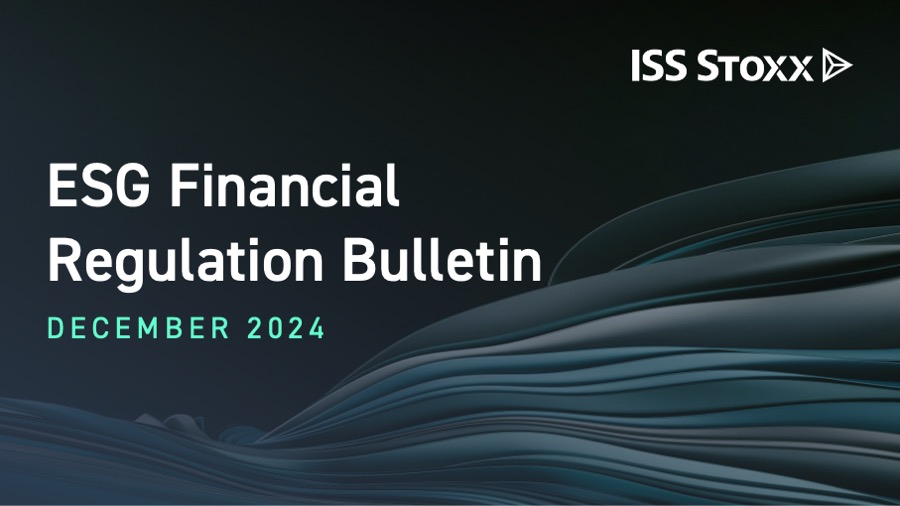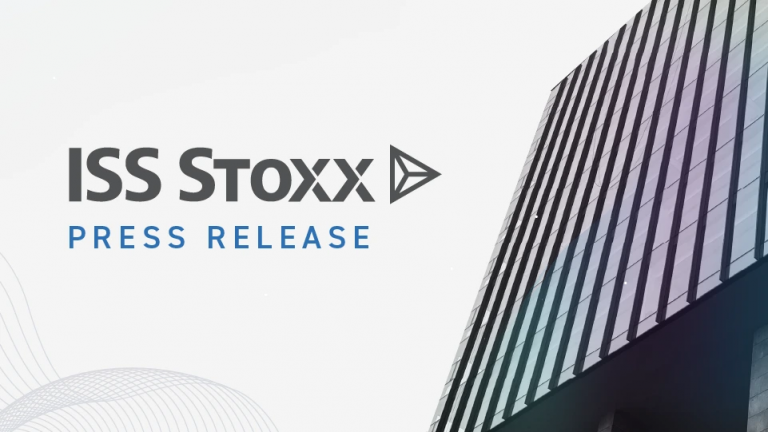
IOSCO
International Organization of Securities Commissions Publishes Report on Impact of Transition Plans Disclosures
The International Organization of Securities Commissions (IOSCO) published a report on November 13 covering the key impacts of, and challenges associated with, transition planning. The IOSCO report focuses on four key areas relating to transition plans: encouraging consistency and comparability of disclosures, promoting assurance of disclosures, improving regulatory and legal oversight, and capacity building. The report also covers potential future initiatives for regulators to improve the standards and consistency of transition plan disclosure. IOSCO supports the IFRS Foundation’s initiative to develop “educational material and, if needed, application guidance to support transition plans disclosures”; the report also encourages other standard setters to publish clarifying documentation on what constitutes forward-looking information disclosure.
IFRS Foundation
The International Financial Reporting Standards Foundation Publishes Guide to Assist with Sustainability-Related Corporate Disclosure
The International Financial Reporting Standards (IFRS) Foundation published a new guide on November 19 covering its approach to materiality, as well as identifying sustainability-related risks and opportunities, in the IFRS S1 General Requirements for Disclosure of Sustainability-related Financial Information. The IFRS S1 standard has become the foundation for the sustainability-related corporate disclosure frameworks in numerous jurisdictions. The guide covers how companies should identify and disclose sustainability risks and opportunities that may impose costs or impact their access to capital. The guide clarifies the IFRS Foundation’s “integrating thinking” on materiality, which prioritizes the “inextricable link between a company and its stakeholders, society, the economy and the natural environment”; in the guide, the IFRS Foundation also links resources to assist companies with making materiality judgements.
TNFD
Taskforce on Nature-related Financial Disclosures Releases Nature-Related Roadmap and Guidance at COP16
During the biodiversity conference at the 16th session of the UN Conference of the Parties (COP16), the Taskforce on Nature-related Financial Disclosures (TNFD) released discussion papers covering how to improve market access to nature-related data and how to standardize nature transition planning. The “roadmap to upgrade market access to decision-useful nature-related data,” published October 26, outlines medium- and long-term strategic goals to improve the nature data value chain. The principles-based document outlines three priorities that will be pilot tested before the release of the final TNFD recommendations in late 2025. TNFD encourages the “development of a composite set of nature data principles, building on existing scientific, open data and corporate assurance standards”; the testing of existing data sets and sources against the standards to identify gaps in coverage and quality; and the beta testing of the Nature Data Public Facility (NDPF) to assess market needs and use cases.
The TNFD’s “draft guidance on nature transition planning,” published October 27, provides corporates and financial institutions with recommended disclosures for their transition plans. The draft guidance builds on the recommendations of the Glasgow Financial Alliance for Net Zero (GFANZ) and the Transition Plan Taskforce (TPT) and outlines a definition of a nature transition plan, as well as guidance on what disclosures should be included and how they should be presented.
GRI
Global Reporting Initiative and European Financial Reporting Advisory Group Release Interoperability Index
The Global Reporting Initiative (GRI) and the European Financial Reporting Advisory Group (EFRAG) co-published an official document on November 22 outlining the alignment between GRI and European Sustainability Reporting Standards (ESRS) reporting requirements. The GRI-ESRS Interoperability Index illustrates data points in the three ESRS implementation guidance documents which closely align with existing GRI reporting standards. The document also clarifies that “companies complying with ESRS requirements can be deemed as reporting ‘with reference’ to the GRI Standards, while GRI reporters can apply their current reporting to prepare an ESRS ‘sustainability statement.’”
GRI and Sustainability Standards Board of Japan Sign Memorandum of Understanding
On November 27, following an inaugural meeting in Tokyo, GRI and the Sustainability Standards Board of Japan (SSBJ) signed a memorandum of understanding (MoU) outlining joint projects and continued engagement on the role of impact reporting and the progress of regulatory initiatives. The MoU also committed to new capacity building activities to enable Japanese companies to “use the GRI Standards as the blueprint for meeting their corporate disclosure needs.”
FSB
Financial Stability Board Publishes Progress Report on Consistency and Comparability of Climate-Related Disclosure Practices
The Financial Stability Board (FSB) released a progress report on November 12 covering global developments to improve climate-related corporate disclosures. The FSB Progress Report reveals that 19 of the 24 FSB member jurisdictions have published regulatory files, guidelines, or roadmaps relating to climate-related disclosures; 17 FSB jurisdictions have proposed voluntary or mandatory disclosures based on the work of both the International Sustainability Standards Board (ISSB) and the Task Force on Climate-related Financial Disclosures (TCFD); and multiple jurisdictions have proposed or introduced assurance requirements on climate-related disclosures. The FSB report also identifies key ongoing challenges related to climate-related financial disclosure practices: the FSB report calls for new initiatives to help address difficulties that small- and medium-sized enterprises, as well as companies in emerging and developing economies, face in implementing ISSB disclosure standards. The FSB report incorporates key findings from the IFRS’ progress report on global climate-related disclosure.

Japan
Paris Agreement Article 6 Implementation Partnership Center Publishes Implementation Progress Report
The Paris Agreement Article 6 Implementation Partnership (A6IP) Center published a report on November 18 covering the implementation status and challenges of global Article 6 adoption. The A6IP, an initiative launched by Japan’s Ministry of Environment and partner organizations, supports global capacity building on Article 6 of the Paris Agreement (for more information on the A6IP, see November Newsletter). The A6IP Center’s report covers global action towards “greenhouse gas emission reduction and other mitigation measures being implemented through international cooperation.” The report highlights countries’ progress and challenges in developing strategies, frameworks, and systems for the implementation of Article 6; the report also notes improvements in many countries’ preparation for, and prioritization of, Article 6 implementation.
Singapore
International Platform on Sustainable Finance Publishes Common Ground Taxonomy
The International Platform on Sustainable Finance (IPSF) presented its Multi-Jurisdictional Common Ground Taxonomy (M-CGT) on November 14, which highlights the interoperability of the EU, China, and Singapore green taxonomies. The M-CGT builds on the 2020 EU-China Common Ground Taxonomy. The latest taxonomy was developed through a collaboration between the People’s Bank of China (PBOC), the Monetary Authority of Singapore (MAS), and the European Union Directorate-General of the European Commission for Financial Stability, Financial Services, and Capital Markets Union (DG FISMA).
The M-CGT is a technical reference document designed to help financial market participants to assess which green bonds, funds, and activities would be considered eligible across the taxonomies of all three participant jurisdictions. The M-CGT was also designed to encourage interoperability in new green taxonomies developed globally, as it can “accommodate the comparison of more jurisdictions’ taxonomies in the future.” The M-CGT analyzes and maps 110 activities across eight focus sectors. For activities with interoperable metrics, the M-CGT assesses the comparative stringency of the different taxonomy criteria and adopts the threshold of the most stringent jurisdiction to guarantee cross-jurisdictional eligibility; for activities with different metrics, the M-CGT identifies “commonalities in the requirements of the taxonomies’ criteria.”
Monetary Authority of Singapore Announces Cooperative Finance Initiative with China
During the 20th Joint Council for Bilateral Cooperation (JCBC) meeting on November 11, MAS announced several new green finance initiatives to strengthen collaboration between Singapore and China’s financial markets. The new initiatives included the development of the M-CGT; a new bond market framework to increase access to the Chinese bond market; new ETF Product Links between the Singapore Exchange (SGX) and the Shenzhen and Shanghai Stock Exchange; and new initiatives to improve access of Singaporean financial institutions to Chinese markets.
Hong Kong
Securities & Futures Commission Hosts Event for ESG Rating and Data Products Providers Code of Conduct
The Hong Kong Securities & Futures Commission (SFC) hosted an event on November 29 celebrating the launch of Hong Kong’s Voluntary Code of Conduct for ESG Ratings and Data Products Providers (VCoC). During the event, SFC encouraged eligible ratings and data products providers to become signatories to the VCoC, which is maintained by the International Capital Markets Association (for more information on the VCoC, see November Newsletter).
Hong Kong Monetary Authority Announces Strategic Partnership with Multilateral Organizations to Promote Climate Investment in Asia
The Hong Kong Monetary Authority (HKMA), Asian Development Bank (ADB), International Finance Corporation (IFC), and other multilateral organizations announced, on November 11, a new strategic partnership designed to combat climate change. The organizations, in collaboration with multiple private sector partners, will attempt to cultivate investment in sectors contributing to Net Zero emissions and greenhouse gas reduction in Asia, such as renewable energy infrastructure and sustainable transportation.
Malaysia
Bursa Malaysia’s Centralised Sustainability Intelligence Solution Awarded ESG Industry Collaboration of the Year Award
The Bursa Malaysia Centralised Sustainability Intelligence (CSI) Solution received the ESG Industry Collaboration of the Year Award during the 7th Regulation Asia Awards for Excellence on November 5. The Bursa Malaysia CSI Solution is designed to support Malaysian companies in integrating “ESG into their business strategies and operations, in part by providing tools to assess carbon emissions across their value chains, and to streamline sustainability reporting.”
Bursa Malaysia Announces Sustainable Finance Initiatives at Inaugural Climate Week
During the Bursa Malaysia inaugural Climate Week, held from November 4 to 8, the securities exchange engaged various stakeholders on ongoing sustainability-related initiatives. On November 7, Bursa Malaysia, in collaboration with the United Nations Global Compact Network Malaysia & Brunei, launched its new Corporate Sustainability Practitioner (CSP) Framework 2.0. The framework builds on the 2021 version 1.0 to enhance “sustainability competencies across corporate rolls… to empower professionals with skills to navigate the complexities” of ESG requirements. Bursa Malaysia Climate Week included innovation competitions for local sustainability-focused startups, as well as educational panels and workshops on IFRS sustainability disclosure standards, transition finance for supply chain companies, and several other sustainability-related topics.
Indonesia
Indonesian Financial Services Authority Hosts Summit to Promote Good Governance in the Financial Sector
The Indonesian Financial Services Authority (Otoritas Jasa Keuanga; OJK) hosted the 2024 Risk and Governance Summit on November 26. The Summit was focused on improving governance, risk, and compliance (GRC) in the financial sector by addressing emerging risks. OJK discussed initiatives to address two primary emerging risks: sustainability and cybersecurity. To address sustainability-related risks, OJK encouraged the “financial services sector to mobilize funding for initiatives guided by the Indonesian Taxonomy of Sustainable Finance and Climate Risk Management & Scenario Analysis (CRMS).” OJK also called on businesses to improve their ESG-related reporting to alleviate greenwashing concerns and better integrate ESG factors into their GRC and business strategies.
Korea
Korean Ministry of Economy & Finance and Asian Development Bank Sign Collaboration Agreement on Central Asian Climate and Sustainability Fund
During the Central Asia Regional Economic Cooperation Ministerial Meeting on November 10, the Korean Ministry of Economy & Finance (MoEF) agreed to support the Asian Development Bank’s (ADB) efforts to support Central Asian Countries in addressing climate change and improving sustainable development. MoEF will contribute $3 million to ADB’s newly developed Climate and Sustainability Project Preparatory Fund (CSPPF). Through its contribution to CSPPF and ongoing capacity building efforts, MoEF aims to “support the development of infrastructure projects in Central Asia and to contribute to supply chain stabilization.” MoEF also met with finance ministers from participating Central Asian countries to discuss strengthening development partnerships between Korean institutions and companies and local Central Asian markets through expanding the “Economic Development Cooperation Fund in critical mineral supply chains, renewable energy, and transportation.”
Australia
Australian Securities & Investments Commission Releases Draft Regulatory Guide on Sustainability Reporting Regime
The Australian Securities & Investments Commission (ASIC) published its draft Regulatory Guide 000 Sustainability Reporting (Draft RG 000) on November 7. The Draft RG 000 provides guidance to large Australian businesses and financial institutions that will be required to publish climate-related disclosures in an annual sustainability report, starting January 1, 2025. In its guide, ASIC provides guidance on which climate-related disclosures should be included in the sustainability report and other financial reports; how the new sustainability disclosure requirements will interact with existing reporting obligations; who will have to submit the new annual sustainability reports; how ASIC “will administer the sustainability reporting requirements”; and how ASIC will make use of its discretion and relief powers. The consultation on Draft RG 000 is open until December 19, 2024. ASIC is seeking stakeholder input on several implementation questions, including whether legislation that grants relief for other financial reporting or auditing requirements should be extended to cover the new sustainability reporting regime.
Australian Prudential Regulation Authority Publishes Findings of a Survey Assessing Climate Risk in the Financial Sector
The Australian Prudential Regulation Authority (APRA) published the findings of its climate risk self-assessment survey on November 13. The APRA survey asked regulated entities in the financial services industry to assess how they identify, manage, and disclose financial climate risk in line with APRA’s Prudential Practice Guide (CPG229). The APRA survey report finds that most large entities have taken steps to improve their climate risk maturity since 2022; there remains, however, broad variance in results, as a quarter of survey respondents reported a decline in their climate maturity score.
The survey results also demonstrate improvements in the average climate risk maturity scores of large banks since 2022. APRA also identified differences across different areas of climate risk management: survey results show that, on average, entities performed better on ‘governance and strategy’ and ‘risk management’ than on their ‘disclosure’ or ‘metrics and targets.’ APRA reiterated its desire to increase expectations for regulated entities to consider climate risks in their decision-making, while highlighting several climate-risk management initiatives first outlined in the APRA 2024-25 Corporate Plan.

EU
European Commission Finalizes Agreement on Carbon Market Rule and Climate Financing at COP29
During the COP29 UN Climate Change Conference in Baku on November 23, the European Commission announced the completion of a pair of climate finance-related initiatives. The European Commission announced the finalization of new international carbon market rules under Article 6 of the Paris Agreement. The new carbon credit rules, classified under Article 6.4 of the Paris Agreement, are designed to increase the transparency and integrity of carbon markets, while reducing costs, by setting a UN-backed standard for high-quality carbon offsets and standardizing the recording and tracking of international carbon deals. In anticipation of the new carbon market rules, the EU published its first Biennial Transparency Report, as outlined in the implementation framework of the Paris Agreement.
The EU Commission also announced the adoption of a New Collective Quantified Goal (NCQG) for Climate Finance. The EU-led NCQG aims to expand the global contributor base for climate financing and strengthen the role of multilateral development banks (MDBs) in raising private capital for green investment. The new NCQG does not assign contribution shares to the EU or any Member State.
European Supervisory Authorities Publish Annual Report on Disclosures of Adverse Impacts under the Sustainable Finance Disclosure Regulation
The European Supervisory Authorities (ESAs), a joint committee of the European Securities and Markets Authority (ESMA), the European Insurance and Occupational Pensions Authority (EIOPA), and the European Banking Authority (EBA), published on October 30 their third annual report on disclosures of principle adverse impacts (PAIs) under the Sustainable Finance Disclosure Regulation (SFDR). The ESAs’ report addresses current disclosure practices of financial institutions relating to their entity and product-level disclosure of “the negative impact of financial institutions’ investments on the environment and people and the actions taken by asset managers, insurers, investment firms, banks and pension funds to mitigate them.” The report finds that, in general, the quality and accessibility of PAI statements under SFDR has improved; the ESAs’ report also provides National Competent Authorities (NCAs) with recommendations to help ensure consistent supervision of SFDR disclosure across the European Union.
European Supervisory Authorities Publish Final Rules on the European Single Access Point to Promote the Availability of Financial and Sustainability Information
The ESAs released their final draft implementing technical standards (ITS) regarding the “collection bodies” and functionality of the European Single Access Point (ESAP) on October 29. ESAP is a centralized platform created to help facilitate “access to publicly available information relevant to financial services, capital markets and sustainability.” ESAP data collection is scheduled to begin in July 2026 and publication on ESAP is planned to begin in July 2027. The ESAs’ final ITS set standards for ESAP “collection bodies”: offices, agencies, and Officially Appointed Mechanisms (OAMS) of the EU and EU Member States tasked with gathering the data submitted to ESAP by regulated entities.
The ITS instruct collection bodies on their timing, formatting, validation, and metadata requirements regarding ESAP. The ESAs also finalized ITS covering the functionality of ESAP and how to make information on the centralized platform more accessible for users. The functionality ITS cover categorizing criteria and identifiers that should be used for reporting entities, the type of information that should be available on ESAP, and the Application Programming Interface (API) that should be made available to data users.
European Insurance and Occupation Pensions Authority Publishes Final Report on Capital Requirements for Insurers’ Fossil Fuel Assets
The European Insurance and Occupation Pensions Authority (EIOPA) published its final “Report on the prudential treatment of sustainability risks within Solvency II” on November 7. The EIOPA report was drafted in line with the mandate outlined by the European Commission to assess the prudential treatment of assets with potential risks related to the EU’s environmental and social objectives. The EIOPA report provides an overview of EIOPA’s backward and forward-looking findings on the market risk of assets left vulnerable to the climate transition, the treatment of social risk, and “the impact of climate risk-related prevention measures on non-life underwriting risks.” In its final report, EIOPA recommends increased capital requirements for insurers’ fossil fuel assets, with different requirements for relevant stocks and bonds.
Council of the European Union Votes to Adopt EU ESG Rating Regulation
The Council of the European Union (the Council), one of the EU’s primary legislative bodies, voted to adopt the new EU regulation on environmental, social, and governance (ESG) rating activities on November 19. The European Parliament had previously voted to approve the ESG Rating Regulation on April 24. The regulation can now be published in the EU Official Journal (OJEU). Once published, ESMA will begin the process of implementing the regulation, having received mandates to elaborate technical requirements for ESG ratings providers. ESG ratings providers will have 18 months from the entry into force of the regulation (20 days after publication in OJEU) to come into compliance.
European Parliament Approves Delayed Timeline for EU Deforestation Law
The European Parliament voted on November 14 to approve an amendment proposed by the European Commission to postpone the application date of the EU deforestation regulation by one year. The European Parliament’s vote follows the Council’s decision to vote in favor of the delayed application date on October 16 (for more information on the Council’s vote and the EU Deforestation Law, see November Newsletter).
UK
UK Treasury Opens Second “Technical Comments” Consultation on Regulatory Perimeter of ESG Rating Provider Legislation
His Majesty’s Treasury (UK Treasury) published the second draft of its legislative “Statutory Instrument – The Financial Services and Markets Act 2000 (Regulated Activities) (Amendment) (No. 2) Order 2024” on November 14, seeking technical comments. The Statutory Instrument lays out the proposed scope of a future regulatory regime meant to oversee the provision of ESG ratings in the United Kingdom. The UK Treasury also published its response to the feedback received during its consultation on a future regulatory framework for ESG ratings, which closed in June 2023. The UK Treasury has invited technical feedback on its draft legislative text by January 14, following which it will be submitted to Parliament for adoption. Once the Statutory Instrument is approved, the Financial Conduct Authority, as the supervisory authority for ESG ratings, will begin work on specific regulatory requirements.
UK Treasury Includes New Green Measures and Funding to Encourage the Transition to Net Zero in Autumn Budget
The UK Treasury published its 2024 Autumn Budget on October 30. The 2024 Autumn Budget includes new investment and incentives to promote clean energy, transportation, and transitions. The Budget also outlines the UK Government’s commitment to publish a Clean Power 2040 Action Plan, a Carbon Budget Delivery Plan, and a new Industrial Strategy to promote sustainability and Net Zero initiatives.
UK Financial Reporting Council Opens Consultation on Revisions to UK Stewardship Code
The UK Financial Reporting Council (FRC) opened a consultation on November 11 to seek input from stakeholders on proposed updates to the UK Stewardship Code. The FRC has proposed revising the UK Stewardship Code’s definition of stewardship; streamlining reporting principles; tailoring service provider disclosure by including reporting principles dedicated to proxy advisory firms and investment consultants; providing guidance on how signatories can demonstrate the implementation of their stewardship practices; introducing policy and context disclosures; and testing new cross-referencing practices for signatories who also disclose against other regulatory standards. The FRC consultation is open until February 19, 2025.
Financial Reporting Council Publishes Annual Review of Corporate Reporting against the UK Corporate Governance Code
FRC published its annual Review of Corporate Governance Reporting 2024 on November 26. The annual report examines current market reporting practices in connection with the UK Corporate Governance Code and aims to support companies as they implement the revised Code from January 2025. The FRC report emphasizes the importance of the UK Corporate Governance Code’s “comply or explain” approach.
The FRC report suggests that corporate explanations for departures from the Code could be improved, while investors, proxy advisors, and other service providers should take steps “to support those companies that provide cogent explanations that demonstrate good governance.” FRC also reports that several companies are already taking steps to report on Provision 29, a recently introduced requirement to strengthen reporting on risk management and internal controls from 2027, despite the change only coming into effect in 2026.

Brazil
Tesouro Nacional Publishes Allocation and Impact Report on Sustainable Sovereign Bonds
The Brazilian Ministry of Finance (Tesouro Nacional) published its first Allocation and Impact Report on sustainable sovereign bonds issuance on November 8. The report covers the issuance of such bonds from November 2023 to June 2024, and it was published in line with the International Capital Markets Association (ICMA) principles. The report is meant to confirm the Brazilian Government’s commitment to its Sovereign Sustainable Bond Framework, which covers resource allocation and how to report impact measures.
By:
Noam Cherki, Associate, Regulatory Affairs & Public Policy, ISS STOXX
Hugo Gallagher, Senior Associate, Regulatory Affairs & Public Policy, ISS STOXX
Karina Karakulova, Director of Regulatory Affairs & Public Policy, ISS STOXX




